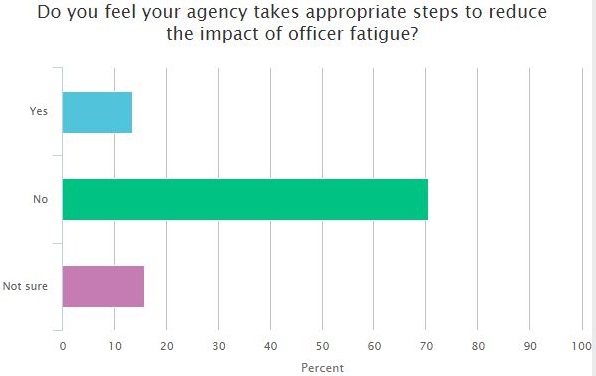Nearly 80 percent of law enforcement officers have experienced an on-the-job “near-miss” event that they attribute at least in part to sleep deprivation or fatigue.
That’s according to a recent Lexipol webinar exploring the impact of fatigue on law enforcement officers and agencies. Only 8 percent of respondents said fatigue had not contributed to a near-miss.
Fatigue most dramatically impacts officers who work nighttime shifts or shifts lasting longer than 8 hours. But there are other reasons officers come to work fatigued: working other jobs, sleep problems stemming from job-related mental trauma, or poor nutrition and exercise are all factors.
Dr. Lois James and Dr. Stephen James, professors at the Washington State University Sleep and Performance Research Center, study how sleep disruption due to shift work leads to operational performance issues. Along with Lexipol’s Gordon Graham, they presented the webinar, which is now available on demand. 
The presenters identify five areas where being tired can have a dangerous impact on public safety personnel:
1. Decision-making. Fatigue makes it more difficult to deal with complex and stressful situations—exactly the type of situation that public safety personnel face every day.
2. Perception. Being tired narrows perception, reducing our ability to put stimuli into context. We become less able to understand what’s going on around us, and react appropriately. This can be especially dangerous for law enforcement officers reacting to aggressive or hostile subjects. “ reduces their ability to actually put into practice what we’ve trained them to do with regard to procedural justice,” Dr. Stephen James says.
3. Motor skills. Studies have demonstrated lack of sleep affects alertness and response time, which can be devastating in public safety, especially while driving. Dr. James notes that 50 percent of police officers report having fallen asleep while driving.
4. Mental and emotional wellbeing. Fatigue can lead to increased anxiety, fearfulness, irritability and hostility, which in turn can lead to conflict at home and in the workplace.
5. Increased risk for serious health issues. Many public safety personnel experience lack of sleep over long periods, even over their entire career. Dr. James explained that chronic lack of sleep can lead to many serious health conditions, ranging from certain cancers to cardiovascular disease, obesity and sleep disorders.
The bottom line: Lack of sleep is a serious issue in public safety, and individuals and agencies must take steps to address it. And according to the webinar participants, we have a long way to go—70 percent of polled respondents said their agency doesn’t take appropriate steps to reduce the impact of officer fatigue.
“We can’t not provide fire service and law enforcement protection 24/7,” Dr. Stephen James says. “But we have to be aware of the risk of asking people to do these jobs and understand the potential consequences. You can’t just man-up or soldier on.”
Interested in learning more? Access the on-demand webinar for additional details and strategies to mitigate the effects of fatigue.
